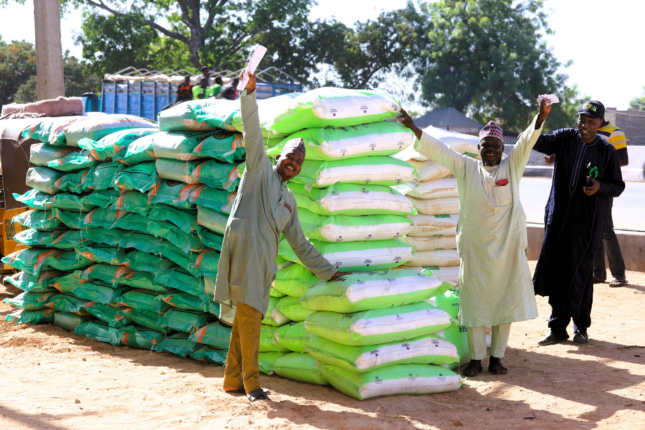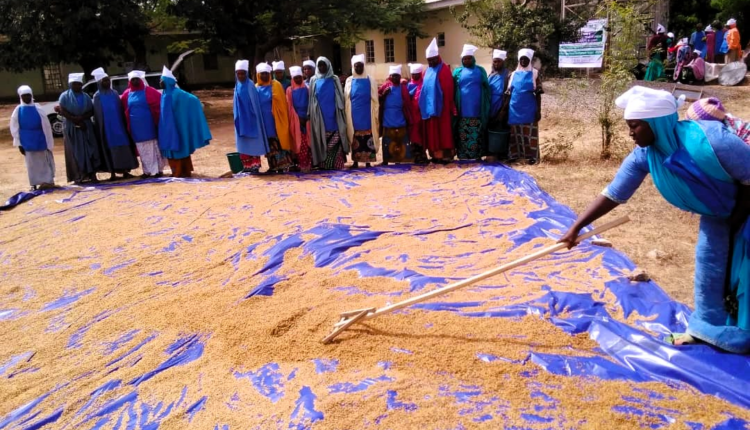KSADP trains over 1,000 women on improved rice parboiling techniques in Kano
The Kano State Agro-Pastoral Development Project (KSADP), has launched a training program to improve rice parboiling techniques for women processors and enhance value addition to the process.
Mr Abdulrasheed Hamisu Kofar-Mata, the Project Coordinator of KSADP-Sasakawa, during the training launch in Rogo and Karaye Local Government areas, emphasized that parboiling plays a crucial role in the rice value chain.
“Traditional methods have resulted in losses and inconsistencies, making adopting improved practices essential, ‘’ Kofar-Mata said.
‘’Recognizing the importance of addressing this need, KSADP has already trained over 160 women groups on modern parboiling techniques since the project’s inception in 2021. However, Mr. Kofarmata reiterated the “significant need for further training.”
This was contained in a statement signed by Moses Nongoatse, Communication Officer, Sasakawa Africa Association Nigeria (SSA), on Wednesday.

The KSADP has, therefore, embarked on a new training initiative to equip 40 women selected from rice processing groups across 20 LGAs in the state. This will directly impact 120 trainees, sharing their acquired knowledge and skills with their respective groups, ultimately benefiting over 1,000 women processors.
Read Also: Your funds are safe in banks, CBN assures depositors
Mallama Hadiza Abdu, Falgore women MPCS group leader in Falgore community, Doguwa LGA, expressed enthusiasm for the training: “I am confident that this training will equip me with the skills to improve the quality of my rice and increase my knowledge and income.”
Engr. Sadiq Hamman, Program Officer for Nutrition-Sensitive Agriculture at KSADP-Sasakawa, highlighted the significant difference in earnings between parboilers using traditional and improved methods. He noted that those utilizing modern techniques earned an average of ₦ 10,235 per parboiling cycle, compared to ₦ 2,489 for the former.
He further emphasized that women actively participate in rice parboiling, contributing approximately 70% of the total labor. This training will equip them with the knowledge and skills to operate parboiling equipment efficiently, saving time, energy, and resources.
Engr. Hamman also stated that modern parboiling methods minimize breakage and bran loss, resulting in higher yields and increased profit potential for the trainees. According to Hamman, other benefits of the Improved parboiling techniques training include:
Increased rice production quality: Modern methods lead to lower breakage and bran loss, resulting in higher-quality rice.
Enhanced profitability: Improved yields and reduced losses translate into increased profits for women processors.
Improved livelihoods: By equipping women with valuable skills and knowledge, the training contributes to improved livelihoods for rural communities.
Empowerment of women: The program directly empowers women by increasing their income and knowledge, contributing to their overall social and economic well-being.
The KSADP remains committed to supporting the growth and development of the rice value chain in Kano State. Through initiatives like this training program, the project aims to empower women processors, improve rice production quality, and enhance rural communities’ livelihoods.
The statement added that the program is funded by the Kano State Government, the Islamic Development Bank (IsDB), and the Lives and Livelihoods Funds (LLF), is focused on empowering smallholder farmers by enhancing the food, nutrition, and income security of the state.
………KSADP distributes inputs to boost dry season vegetable productivity in Kano
Meanwhile, Kano State government has distributed farm inputs to 150 vegetable farmers learning clusters in 20 Local Government Areas for the 2023/2024 Dry Season farming activities.
SOLACEBASE reports that this initiative is built upon the project’s recent establishment of 150 demo clusters of tomato, onion, and cabbage in vegetable-producing communities of the state.
Speaking at the distribution event in Kano, Project Coordinator Abdulrasheed Hamisu Kofar-Mata emphasized the project’s commitment to assisting farmers in adopting improved technologies and achieving higher yields of tomatoes, onions, and cabbage.
Read Also: Bye-Elections: PDP fixes date to hold primary
Kofar-Mata said these clusters will serve as Farmer Learning Platforms (FLPs) during the upcoming dry season, providing vital knowledge and resource-sharing opportunities for farmers across the area.
“After establishing Farmer Learning Platforms in 20 key vegetable-producing LGAs, the KSADP provided all the necessary inputs for healthy crop development and productivity,” Kofarmata explained. “
‘’This intervention directly contributes to improving the livelihoods of smallholder farmers in our communities.”

Extension Agents during the KSADP vegetable inputs distribution in Kura, Kano State
In addition to establishing FLPs and providing essential inputs, the KSADP will offer comprehensive technical support to farmers throughout the cultivation process. This includes:
Training and on-farm support: KSADP/SAA Regenerative Agriculture technical officers will provide farmers with training and practical support, ensuring successful technology adoption and Constant supervision: Extension agents and community-based facilitators will offer ongoing guidance and leadership to farmers.
“By combining training, technology transfer, and community engagement, the KSADP is committed to promoting vegetable production in Kano State,” Kofarmata added. “We aim to strengthen nutrition/food security, boost agricultural productivity, and improve farmers’ livelihoods across the state.”
The programme officer of Regenerative Agriculture SAA/KSADP, Mr Tijjani Tanko, detailed the specific inputs distributed to farmers:
• High-quality seeds: Tomato (DIVA-F1/PADMA-108 F1), onion (PREMA), and cabbage (PASKE)
• Immune booster for tomato (ABSTRACT)
• Enzymes for onions (AGRIZYME)
• NPK 20:10:10 fertilizer
• Urea fertilizer
• Liquid fertilizer for onions (FOLIAR-PLUS)
• Pre-emergent herbicide for onions (BUTACHLOR (EXTRACTOR))
• Systemic insecticide for tomato (TIHAN)
• Insecticides for cabbage (LARA-FORCE) and tomato (LARA-FORCE)
• Pesticides for onions (SHARP-SHOOTER)
• Muriate of potash (MOP) for onions and cabbage
• Fungicide for tomato and cabbage (RODIMIL GOLD)
“This intervention is expected to significantly increase vegetable production by 20%, improve income for participating farmers by 30%, and enhance food security in Kano State,” Tanko stated.
The KSADP is a five-year initiative funded by the Islamic Development Bank (IsDB) and the Lives and Livelihood Funds (LLF) to revitalize the agricultural sector in Kano State. The project focuses on increasing agricultural productivity, enhancing market access, and improving livelihoods for smallholder farmers.



Comments are closed.